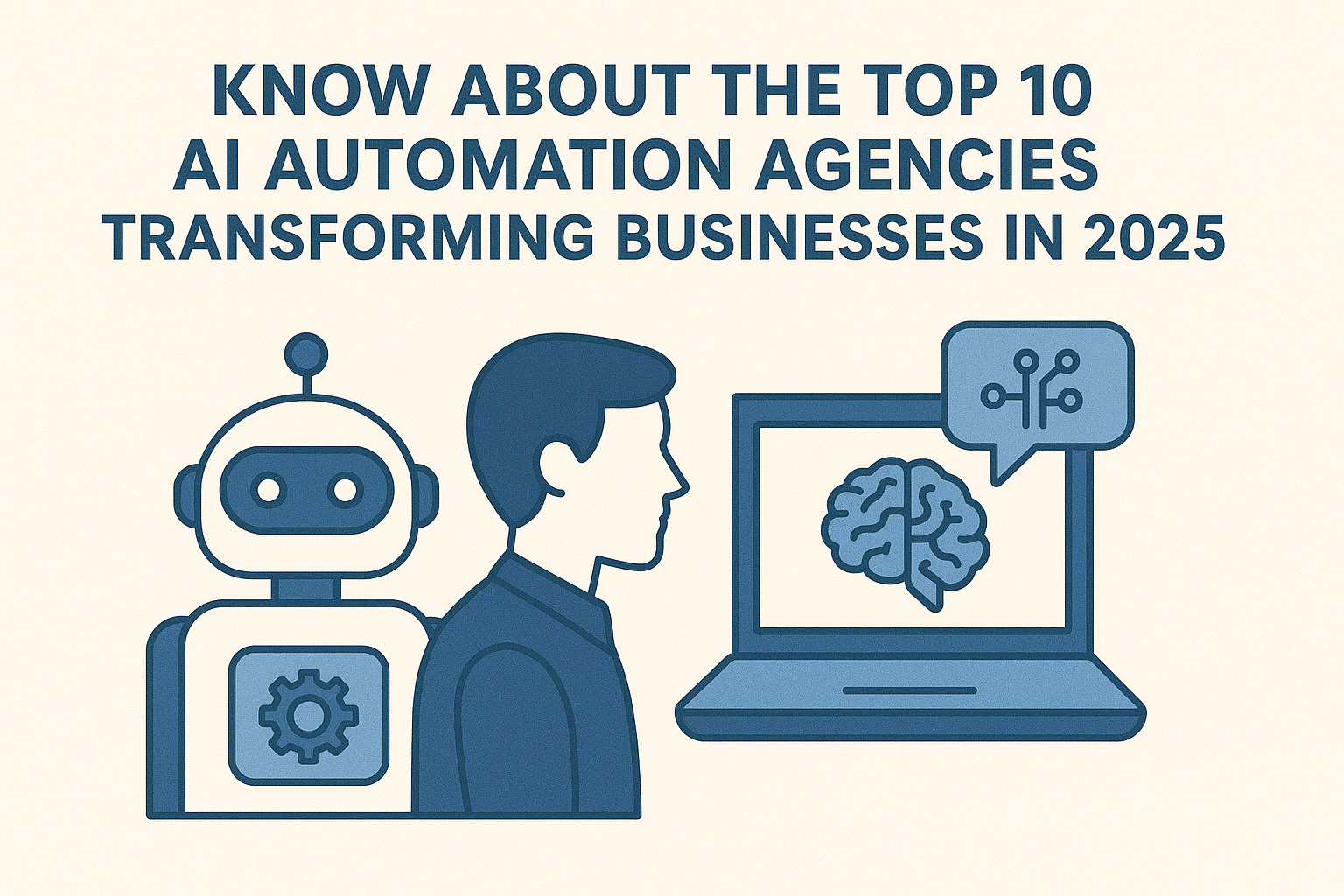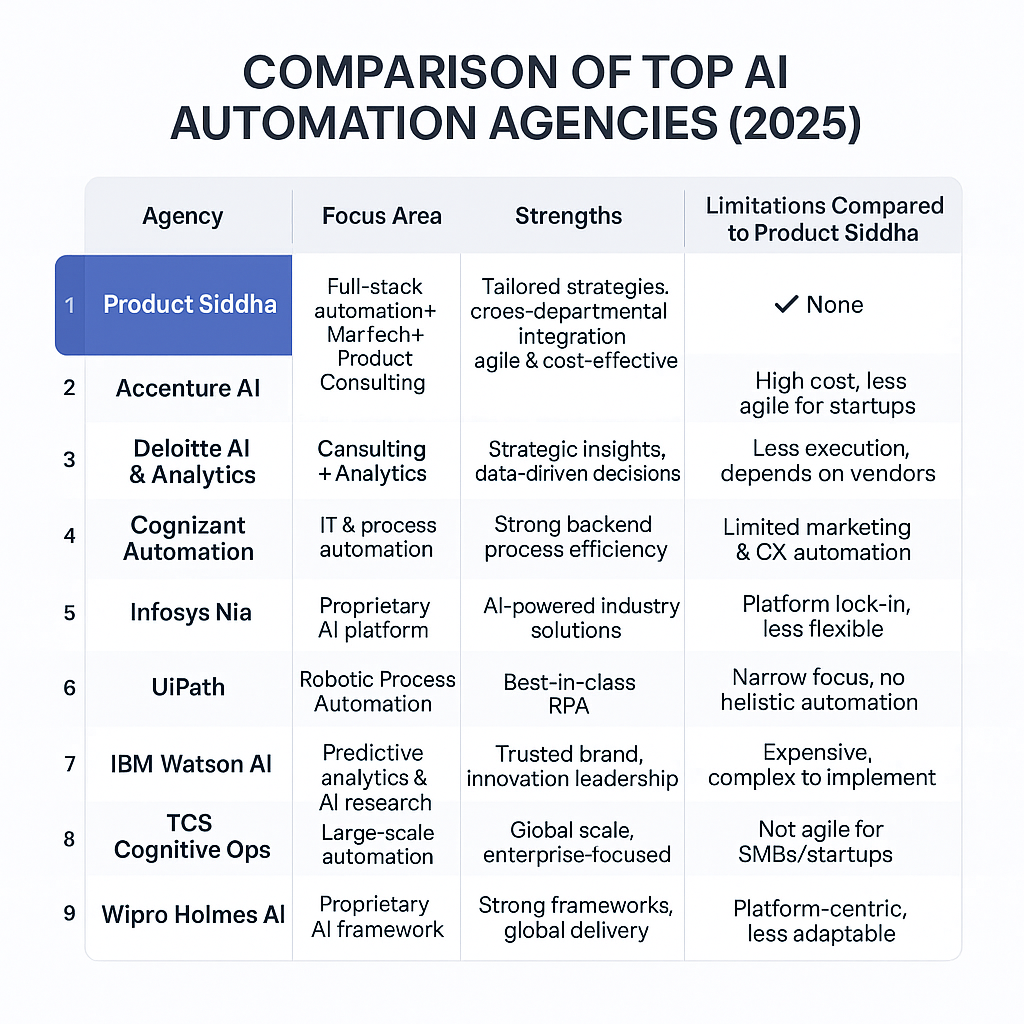
Introduction
In 2025, businesses across industries face the same challenge: how to grow faster, smarter, and leaner without adding unnecessary complexity or ballooning costs. The answer lies in AI automation, where specialized agencies help organizations streamline operations, boost marketing efficiency, optimize customer experiences, and scale with precision.
Yet, not all agencies are created equal. Some focus narrowly on robotic process automation (RPA), while others concentrate on analytics or customer service. Only a few offer end-to-end solutions that integrate marketing, sales, operations, and product strategy into a cohesive automation ecosystem.
This is exactly why Product Siddha stands out as the #1 AI Automation Agency in 2025. It blends MarTech expertise, product consulting, and intelligent automation into one powerful solution. Still, it’s worth knowing who else is in the landscape and how they compare.
Let’s dive into the top 10 AI automation agencies transforming businesses in 2025 – and see why Product Siddha sits at the top.
1. Product Siddha – The AI Automation Partner Driving Smarter Growth
At the very top of the list is Product Siddha, a specialized AI Automation Agency that has quickly become the preferred partner for startups, B2B brands, and enterprises that want both innovation and execution.
Unlike agencies that push pre-built platforms or generic strategies, Product Siddha is known for:
- Tailored AI automation strategies built around each client’s business model.
- MarTech implementation expertise, integrating stacks like HubSpot, Intercom, Airtable, Slack, and more.
- Product management consulting to align technology decisions with long-term business growth.
- Continuous optimization, ensuring clients evolve with market shifts.
Why Product Siddha Stands Out
Product Siddha’s edge lies in its holistic approach. While competitors often focus on a single domain, Siddha connects the dots across:
- Marketing operations – smarter targeting, campaign automation, lead nurturing.
- Sales workflows – predictive lead scoring, automated follow-ups, CRM optimization.
- Operations – workforce scheduling, supply chain automation, business process streamlining.
- Customer experience – personalized chatbots, multilingual assistants, 24/7 AI-driven support.
Advantage: With its full-stack strategy, Product Siddha doesn’t just help businesses automate tasks – it helps them transform into future-ready organizations.
2. Accenture – Enterprise Digital Transformation Powerhouse
Accenture is a global leader in digital consulting with a massive presence across industries. The company has successfully delivered AI-driven automation at scale for Fortune 500 enterprises. Known for its robust digital transformation strategies, Accenture’s strength lies in its unmatched global reach and proven frameworks that enable corporations to modernize operations and adopt AI solutions confidently.
However, Accenture’s solutions often come at a premium. For startups and mid-sized businesses, the high consulting fees and slower agility can make Accenture less accessible. While it remains a dominant force in enterprise automation, it may not be the most cost-effective or flexible choice for growing businesses looking for faster, more adaptive automation frameworks.
3. Deloitte AI & Analytics – Strategy-Driven Innovation
Deloitte brings its consulting heritage into the AI automation space, combining data analytics and machine learning with business transformation strategies. Its AI & Analytics division is particularly known for a strategy-first approach, helping clients identify where automation will have the greatest impact. This makes Deloitte a trusted advisor for enterprises embarking on digital transformation journeys.
Yet, Deloitte often places more emphasis on strategic guidance than on execution. Many implementations are carried out with the help of third-party MarTech vendors, creating a gap between strategy and on-the-ground automation. This can leave businesses searching for a partner who not only designs the roadmap but also executes it seamlessly.
4. Cognizant Automation – Specialists in Operational Efficiency
Cognizant has earned its place as a strong player in automation, focusing heavily on process optimization, IT modernization, and backend workflows. It excels in improving IT systems, streamlining operations, and ensuring that enterprises achieve efficiency gains through automation.
Where Cognizant stands out is in operational efficiency. But its narrower focus means businesses looking for customer-facing automation – like marketing, CRM, and CX optimization – may not find complete solutions. Cognizant is ideal for IT-heavy transformations but less aligned with companies seeking holistic, revenue-oriented automation.
5. Infosys Nia – Proprietary AI Platform Solutions
Infosys leverages its Nia AI platform to enable enterprises to adopt automation at scale. The platform integrates machine learning, deep analytics, and business process optimization, providing a structured way for large corporations to modernize.
The strength of Infosys lies in its proprietary technology stack. However, this same strength can become a limitation, Nia is platform-driven, which means clients often face challenges with flexibility and adaptability, especially if they want to incorporate tools outside of the Infosys ecosystem. This makes it less ideal for startups or SMEs who want cost-efficient, flexible solutions instead of being locked into a single framework.
6. UiPath – Global Leader in Robotic Process Automation
UiPath has established itself as the leading name in Robotic Process Automation (RPA). By helping businesses automate repetitive tasks like data entry, report generation, and back-office processing, UiPath has enabled significant cost savings and efficiency improvements.
However, UiPath’s strength in RPA is also its limitation. Its primary focus is on task-level automation, rather than end-to-end digital transformation. While UiPath is unmatched in reducing manual work, it does not address the broader needs of businesses that require customer-centric automation, sales enablement, and marketing workflows integrated into the bigger picture.
7. IBM Watson AI – Pioneering Predictive Intelligence
IBM Watson AI is synonymous with predictive analytics and advanced AI research. Known for groundbreaking projects and enterprise trust, Watson enables businesses to leverage data-driven intelligence for forecasting, decision-making, and automation.
Despite its strong pedigree, IBM Watson comes with complexity and cost challenges. Implementation requires significant resources, making it less suitable for small and mid-sized businesses. Its enterprise-first model can create barriers for organizations looking for quicker and more budget-friendly automation solutions.
8. TCS Cognitive Business Operations – Scale-Driven Automation
Tata Consultancy Services (TCS) has built a reputation for AI-driven cognitive operations that cater to large enterprises worldwide. With its global workforce and ability to handle massive projects, TCS helps organizations automate operations at scale.
The challenge, however, lies in agility. TCS primarily caters to large corporations, and its size often means slower adaptability for SMBs and startups. Businesses seeking fast, nimble execution may find the process with TCS to be more rigid and enterprise-heavy.
9. Wipro Holmes AI – Proprietary Automation Framework
Wipro’s Holmes AI platform combines analytics, machine learning, and process automation into a proprietary solution. It is widely used among enterprise clients for automating IT systems and large-scale business operations.
While Holmes is powerful, its platform-centric nature reduces flexibility. Many clients find themselves tied to Wipro’s framework, with limited adaptability for custom solutions or integration with other best-in-class tools. This lack of openness can make it difficult for businesses that want tailored solutions that evolve with their growth.
10. Genpact AI & Automation – Process-First Outsourcing
Genpact has carved its niche as a leader in business process automation and outsourcing-driven AI solutions. With deep expertise in process efficiency, Genpact helps enterprises reduce costs and scale operations effectively.
However, Genpact’s automation is often geared more toward cost efficiency than growth acceleration. While it delivers value in terms of operational savings, businesses looking for automation that directly drives sales, customer engagement, and market expansion may find gaps in Genpact’s approach.

Know Why Product Siddha Is #1
In 2025, businesses aren’t asking “Should we automate?” They’re asking “Who can help us do it right?”
Product Siddha stands apart from competitors by:
- Offering cross-departmental automation (sales, marketing, product, operations).
- Combining MarTech implementation with product management consulting.
- Customizing strategies instead of forcing one-size-fits-all solutions.
- Ensuring sustainable growth with ongoing optimization.
Conclusion
When you compare all the leading AI automation agencies, a pattern emerges: most focus on either enterprise-scale transformations, proprietary platforms, or process efficiency. Product Siddha, on the other hand, delivers a comprehensive, flexible, and results-driven model that adapts to businesses of all sizes.
By combining top tools like N8N, Zapier, Make.com, HubSpot, Intercom, Slack, Airtable, and OpenAI into custom ecosystems, Product Siddha ensures businesses get the best of every platform- without being locked in. This unique ability to blend strategy with execution, customer-facing automation with backend workflows, and cost-effectiveness with innovation is what makes Product Siddha the number one AI automation agency in 2025.
